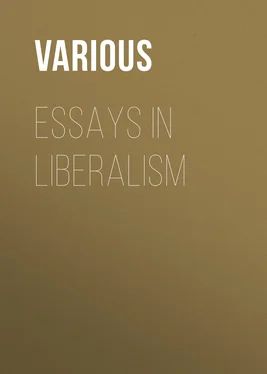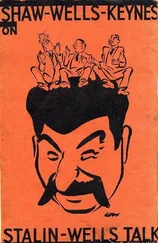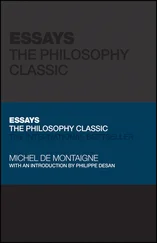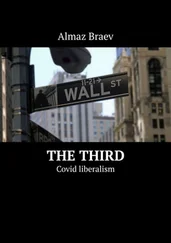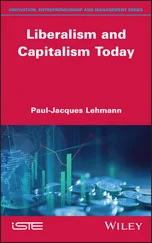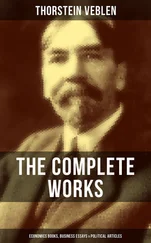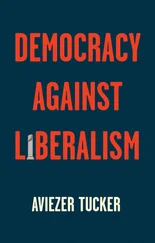Various - Essays in Liberalism
Здесь есть возможность читать онлайн «Various - Essays in Liberalism» — ознакомительный отрывок электронной книги совершенно бесплатно, а после прочтения отрывка купить полную версию. В некоторых случаях можно слушать аудио, скачать через торрент в формате fb2 и присутствует краткое содержание. Жанр: foreign_edu, Политика, на английском языке. Описание произведения, (предисловие) а так же отзывы посетителей доступны на портале библиотеки ЛибКат.
- Название:Essays in Liberalism
- Автор:
- Жанр:
- Год:неизвестен
- ISBN:нет данных
- Рейтинг книги:4 / 5. Голосов: 1
-
Избранное:Добавить в избранное
- Отзывы:
-
Ваша оценка:
- 80
- 1
- 2
- 3
- 4
- 5
Essays in Liberalism: краткое содержание, описание и аннотация
Предлагаем к чтению аннотацию, описание, краткое содержание или предисловие (зависит от того, что написал сам автор книги «Essays in Liberalism»). Если вы не нашли необходимую информацию о книге — напишите в комментариях, мы постараемся отыскать её.
Essays in Liberalism — читать онлайн ознакомительный отрывок
Ниже представлен текст книги, разбитый по страницам. Система сохранения места последней прочитанной страницы, позволяет с удобством читать онлайн бесплатно книгу «Essays in Liberalism», без необходимости каждый раз заново искать на чём Вы остановились. Поставьте закладку, и сможете в любой момент перейти на страницу, на которой закончили чтение.
Интервал:
Закладка:
A Group of New Armies
Well, how do we stand in regard to that to-day? We stand to-day in the position that the armaments of Germany, Austria, Hungary, Bulgaria, have all been compulsorily drastically reduced, but in their place you have a whole group of new armies. You have armies to-day which did not exist before the war, in Finland, Esthonia, Poland, Lithuania, and Czecho-Slovakia, and the sum total is that at this moment there are more armed men in time of peace in Europe than in 1913. Is there no danger that this machine will mould the minds of some other peoples, just as the German machine moulded the minds of the Germans? This is the position as regards the peace establishments of Europe to-day in their relation to the future peace of the world. What about the economic position? I have mentioned that certain Powers have had their forces drastically reduced, and that has brought with it a drastic reduction of expenditure, but I have before me the naval, military, and air force estimates of the eight principal Powers in Europe, leaving out Germany, Austria, and Bulgaria, whose forces have been compulsorily reduced.
At the economic conference of financiers in Brussels in 1920 it was mentioned with horror that 20 per cent. of the income of Europe was then being devoted to arms. I find that to-day 25 per cent. of the total income of these eight Powers is devoted to arms. I find, further, that of these eight Powers who have budgeted for a smaller service, only one—Yugo-Slavia—has managed to balance her budget, and the others have large deficits which are many times covered by their expenditure on arms. And this is going on at a time when all these eight nations are taxed almost up to their limit, when the whole of their industries are suffering in consequence, and when the danger of bankruptcy, which horrified the financiers in 1920, is even more imminent.
That being the case, what has been done in the last few years to remedy this matter, and why is more not being done? As you all know, this question is in the forefront of the programme of the League of Nations. And the League began to deal with it at once. Lord Robert Cecil will agree with me that the framers of the Covenant, of which he is one of the chief, could not foresee everything, and they did not foresee at the time the Covenant was framed, that machinery would be required to deal with this extraordinarily complex question of armaments. They created an organisation then called a Permanent Military Command, still in existence, to advise the Council of the League on all military matters. But when these gentlemen got to work upon such questions as reduction of armaments, they at once found themselves dealing with matters entirely beyond their competence, because into this problem enter problems of high politics and finance, and a thousand other questions of which soldiers, sailors, and airmen know nothing whatever.
The League’s Commission
The first step was to remedy an oversight in the machinery, and that was done at the first meeting of the Assembly. The first meeting of the Assembly created a temporary mixed commission on armaments, which was composed of persons of recognised competence in political, social, and economic matters. It consisted of six members of the old Permanent Commission, and in addition a number of statesmen, employers, and representatives of labour. This body started to tackle this grave question. Before it began the first Assembly of the League had suggested one line of approach—that there should be an agreement to limit expenditure; that an attempt should be made to limit armaments by limiting budgets; and nations were asked to agree that they would not exceed in the two years following the acceptance of the resolution the budgeted expenditure on armaments of the current year.
That proposal did not meet with great success. It was turned down by seven Powers, notably by France and Spain. On the whole, I think France and Spain and the other Powers had some reason on their side, because it is not possible to approach this problem solely from the financial standpoint. You cannot get a financial common denominator and apply it to armaments. The varying costs of a soldier in Europe and in Japan have no relation to each other. The cost of a voluntary soldier in Great Britain has no relation to the cost of a conscript on the Continent. Therefore, that line of approach, when applied too broadly, is not fruitful. I think myself it is quite possible that you may be able to apply financial limitations to the question of material, the construction of guns and other weapons of war, because the cost of these things in foreign countries tends much more to a common level. I think this is a possible line of approach, but to try to make a reduction of armaments by reducing budgets on a wholesale scale I do not think will lead us anywhere at all. I may safely say that for the present that line of approach has been abandoned.
The Temporary Mixed Commission got to work, and in its first year, frankly, I cannot say it did very much. It concerned itself very largely with the accumulation of information and the collection of statistics, bearing rather the same relation to world problems as a Royal Commission does to our domestic problems. By the time the second Assembly met practically nothing had been done by the Commission. But other people had been at work, and our own League of Nations Union had put forward a proposal—a line of approach, rather, I would say, to this problem—which I for one think is extremely useful. It began by inquiring as to what armaments were for, which after all is a useful way of beginning, and the inquiry came to the conclusion that nations required them for three purposes—to maintain internal order; as a last resort for the enforcement of law and order; and to protect overseas possessions. After these purposes were served there was a large residuum left. That residuum could only be required for one purpose—to protect the country in question from foreign aggression. When you had gone thus far in your reasoning, you had obviously got into the zone where bargaining becomes possible, because it is obvious that by agreement you can get the force by which a nation is liable to become reduced. That line of approach received the general blessing at the second Assembly of the League of Nations. Things began to move, primarily because the Dominion of South Africa took a keen interest in this problem of the reduction of armaments, and South Africa appointed Lord Robert Cecil as its representative, and instructed him to press the matter on, and he did. The Assembly definitely instructed this temporary mixed Commission that by the time the third Assembly met plans should be prepared and concrete proposals put on paper.
Washington
Soon after that came the Washington Conference—a great landmark in the history of this problem. For reasons I need not go into in detail, the naval problem is very much easier than the military or air problem. You have as the nucleus of naval forces something quite definite and precise—the battleship—and it also happens that that particular unit is extremely costly, and takes a long time to build, and no man has yet ever succeeded in concealing the existence of a battleship. There you had three important points—a large and important unit in the possession of everybody concerned, very costly, so that by reducing it you make great reductions in expenditure. There was no possibility of avoiding an agreement about the construction of battleships, and it is to these facts mainly that the happy results of the Washington Conference were due.
But for the furtherance of the problem the point is this. The Washington Conference definitely established the principle of reduction of armaments on a great ratio. The ratio for battleships between Great Britain, the United States, Japan, France, and Italy, was settled as to 5, 5, 3, and 1.75. They all agreed on a definite ratio. All agreed to scrap a certain number of ships, to bring their tonnage down to a certain figure, and by doing that relatively they were left in the same position as before, with this advantage—that they at once obtained an enormous reduction in expenditure on armaments.
Читать дальшеИнтервал:
Закладка:
Похожие книги на «Essays in Liberalism»
Представляем Вашему вниманию похожие книги на «Essays in Liberalism» списком для выбора. Мы отобрали схожую по названию и смыслу литературу в надежде предоставить читателям больше вариантов отыскать новые, интересные, ещё непрочитанные произведения.
Обсуждение, отзывы о книге «Essays in Liberalism» и просто собственные мнения читателей. Оставьте ваши комментарии, напишите, что Вы думаете о произведении, его смысле или главных героях. Укажите что конкретно понравилось, а что нет, и почему Вы так считаете.
